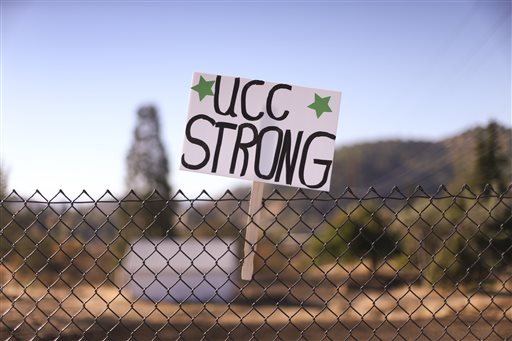By Bailey Hosfelt

In the wake of the Oct. 1 shooting at Umpqua Community College that left nine dead and an additional nine seriously injured, the commentary given by news reporters and politicians alike mimics what has been said following every violent massacre in the past decade. The claim that mental illness is to blame for these massacres overshadows the debate on gun control, while every major media outlet publicly broadcasts the shooter’s name, motive and life story.
President Obama responded to this tragedy, delivering yet another speech to offer his condolences to the grieving families who lost loved ones, but quickly emphasized that the nation’s thoughts and prayers are simply not enough. His exhausted appearance furthered his claim that the reaction to mass shootings has become so routine that we are numb to the prevalent occurrence of such atrocities. Our nation’s willingness to spend trillions of dollars and devote entire governmental agencies to prevent terrorist attacks, yet disregard the topic of gun control in Congress altogether proves Obama’s argument that something must change is true.
While his address to the nation was in clear support of instituting stricter gun regulations, he candidly stated that as American people “we are collectively answerable to those families [who lost loved ones].” By urging Democrats, Republicans and Independents to all regard gun control as an important issue when voting for candidates, he demonstrated that this is not a matter of politics, but rather one of human lives. Regardless of party affiliation, American citizens should be willing to make the necessary changes to limit the number of innocent victims becoming part of a constantly-growing statistic.
The first step to properly addressing this problem is to focus on the real issue and not hide behind faulty excuses. The only time the topic of mental health is at the forefront of any conversation is in the aftermath of a mass shooting in order to try to psychologically justify why the horrible event happened. However, the excuse of mental illness is a scapegoat that only steers the conversation away from what should really be discussed: gun control.
The discussion that follows a mass shooting perpetuates the deeply misleading stigma surrounding mental illness. A study published by the American Journal of Public Heath revealed that fewer than 5 percent of the 120,000 gun-related killings were perpetrated by people diagnosed with mental illness. This fact alone reveals that the large majority of people with mental disorders are non-violent individuals who are falsely stereotyped as perpetrators of violence.
These inhumane individuals who commit such acts are typically not people with mental disorders who just “snap,” but rather ones who methodically plan their attack in a very calculated manner. Mass murderers are typically marked by personality traits of resentment, self-righteousness and a sense of entitlement. The 1997 book “Flash Point,” written by Dr. Michael D. Kelleher, explains that these killers are “rarely insane, in either the legal or ethical senses of this term,” but instead become “collectors of injustice who nurture their wounded narcissism.” They blame others for their frustrations and externalize this anger in a public and deathly manner.
Because perpetrators frequently pay obsessive attention to previous publicized massacres, the media is doing our nation a disservice by providing the killer with a clear audience. The aggressors of mass shootings, such as those responsible for the mass murders at Virginia Tech and Newtown, explicitly cite previous shooters as inspiration for their respective acts of violence. Shooters often use the 1999 Columbine shooting as a touchstone because it was the first highly-broadcasted deadly school shooting that received massive media coverage.
These twisted individuals see and seize an opportunity for their personal act of terrorism to become a public spectacle. If journalists were to change their practices and deprive the killer of their craved audience, mass shootings could potentially decrease. Reporters should never reveal the shooter’s name and face, for this concealing of identity would lessen any individual’s motive to execute a violent act for “fame.”
Journalists should not speculate on a shooter’s motive. Often times, they magnify the slightest injustice or hardship that occurred in the shooter’s life and therefore skew the consumer’s perception and justify the perpetrator’s actions. Additionally, news coverage should remove photos and videos of both the event and the distraught families. The inclusion of these magnifies the reactions that past and future perpetrators hope to receive and desensitizes our society to these losses of blood.
Ultimately, we need to drastically alter the way we respond to mass shootings. The media highlights the idea that mental illness is to blame. This inaccurately stereotypes the 43.8 percent of American adults suffering from disorders such as unstable individuals who are more likely to execute a violent act. Politicians quickly respond that we need to do a better job dealing with mental health, but rarely provide a suggested solution. Therefore, as a nation we cannot continue to make excuses to avoid talking about the controversial topic of gun control. Jeb Bush may just think “stuff happens,” but we should not.
Bailey Hosefelt, FCRH’19, is undecided in her major from Wheeling, West Virginia.










































































































































































































